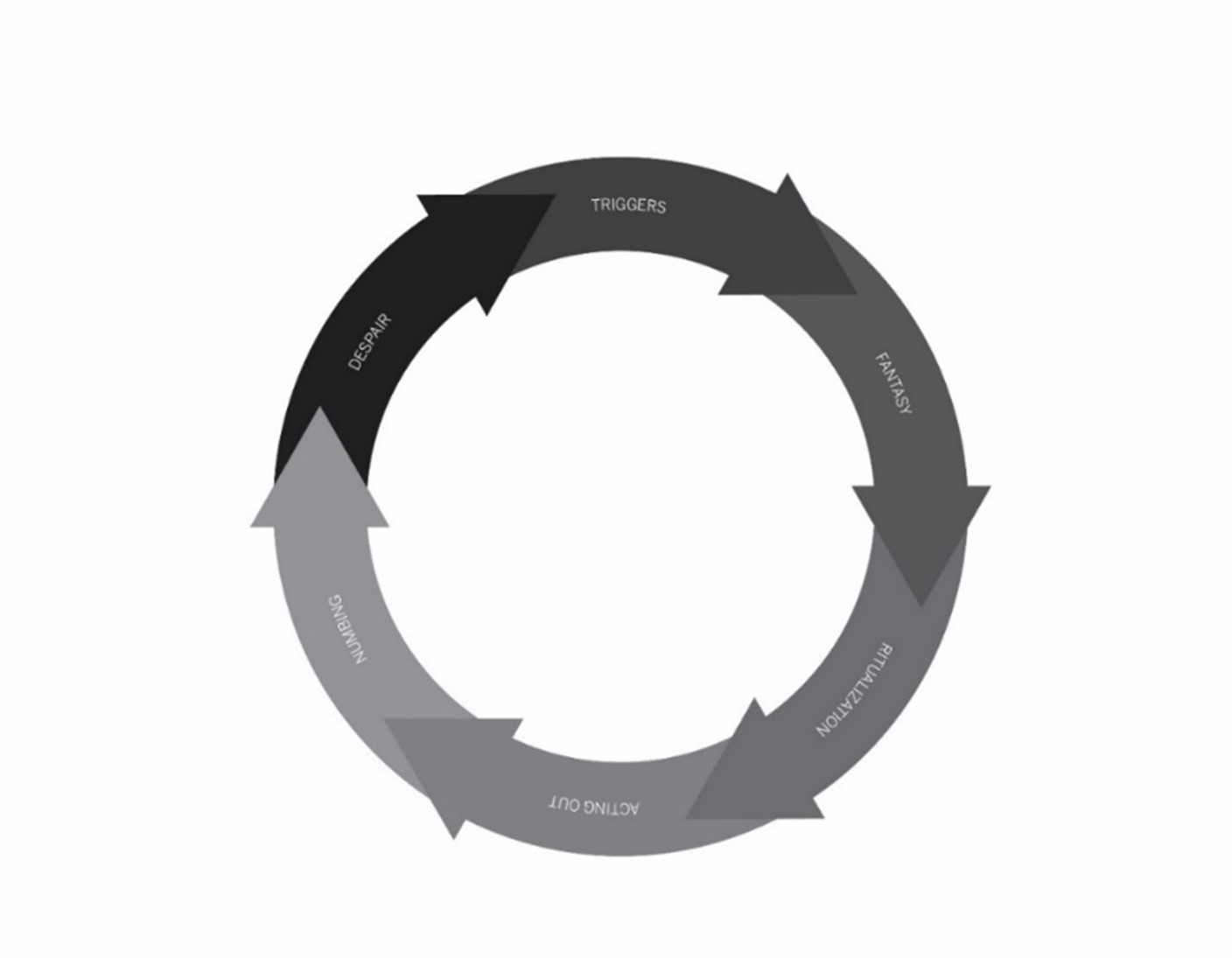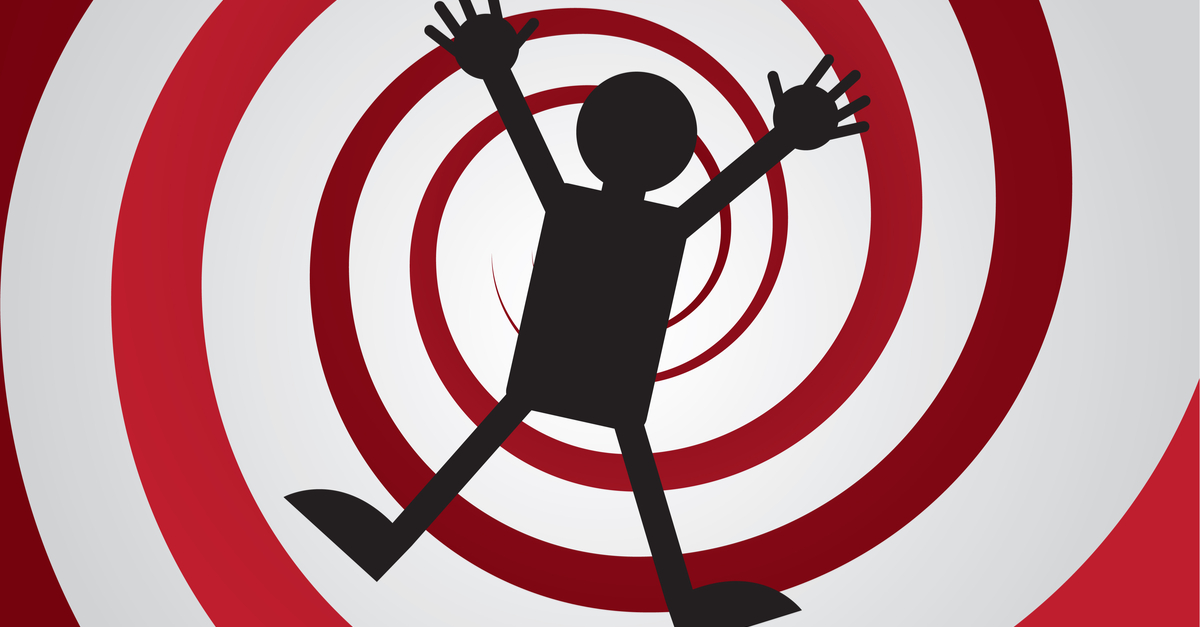 Dr. Robert Weiss LCSW, CSAT
Dr. Robert Weiss LCSW, CSAT
All addictive behaviors are cyclical in nature, with no clear beginning or end to the cycle and one stage leading to the next (and then the next, and the next, and the next). Over time, addicts tend to find themselves stuck in an endless loop of addictive behaviors.
Over the years, various models of the addiction cycle have been proposed. With sex and porn addiction, I generally prefer a six-stage model, shown below:

- Stage One – Triggers (Shame/Anxiety/Depression/Other Strong Emotions): Triggers are catalysts that create a need/desire to act out sexually. Most often, triggers are some sort of ‘pain agent.’ Pain agents include emotional, psychological, and even physical discomfort, either short-term or long-term. Depression, anxiety, loneliness, boredom, stress, shame, anger, and any other uncomfortable feeling can easily trigger an addict’s desire to escape, avoid, and dissociate. Positive agents can also serve as triggers. So, if an addict gets fired from their job, they will want to act out; and if that same addict gets a great new job, they will again want to act out. Triggers can also be visual (seeing a sexy image on a billboard), auditory (hearing a noise that reminds the addict of sex or porn), or even smell, touch, or taste related. If triggers are not dealt with in a healthy way (such as reaching out to supportive others), the cycle inevitably slides forward into stage two.
- Stage Two – Fantasy: After being triggered, sex and porn addicts will automatically start thinking about sex. At this point, they become preoccupied, at times to the point of obsession, with sex-related fantasies. And their fantasies do not involve memories of bad experiences or unwanted consequences. Once they are actively engaged in fantasy, it is very difficult to stop the cycle without some sort of outside intervention.
- Stage Three – Ritualization: Ritualization is where fantasy moves toward reality. This stage adds excitement, intensity, and arousal. For example, the addict logs on to the computer and surfs social media and then hookup apps as a precursor to visiting porn sites or engaging in a one-night stand. Real world issues and concerns steadily disappear as the addict moves toward action on their sexual fantasies.
- Stage Four – Acting Out: Along with fantasy and ritualization, this stage of the cycle provides sex and porn addicts with an escapist neurochemical high. Addicts sometimes refer to this emotionally escapist state as being in ‘the bubble’ or ‘the trance’ because they ‘lose themselves’ while fantasizing, ritualizing, and acting out. This, more than orgasm, is the true objective of addictive sex. Often, addicts put off the sexual act and orgasm for as long as possible because orgasm ends the escapist high and tosses them back into the real world.
- Stage Five – Numbing (Denial): After acting out, sex and porn addicts may attempt to distance themselves emotionally from what they’ve just done. Their denial kicks in full force as a way to temporarily protect themselves from the next stage.
- Stage Six – Despair (Shame/Anxiety/Depression/Other Strong Emotions): Eventually, numbing dissipates. When it does, addicts start to feel ashamed and remorseful. Exacerbating these unwanted emotions is the fact that they also feel powerless to stop their cycle of addiction. In this way, stage six spins the cycle back to stage one.
Typically, the cycle of sex and porn addiction intensifies with each repetition. Addicts require more of the same behavior or more intense forms of behavior to reach or maintain the desired neurochemical high. This transforms the cycle from a repetitive loop into a downward spiral leading to relationship, work, health, financial, legal, and other crises. And all of these crises can serve as triggers, setting the cycle in motion yet again.
Can the Cycle Be Stopped?
The sex and porn addiction cycle is best interrupted in the early portion of stage one, when triggers first arise. If addicts learn to recognize their triggers (emotional discomfort, certain people or places, etc.), they can engage in contrary actions designed to:
- Stop sexual thoughts before they escalate into fantasy, ritualization, and acting out.
- Deal with the unwanted, uncomfortable feelings (the triggers) in an emotionally healthy way.
It may be possible to stop the cycle if it has progressed into fantasy or even into the early ritualistic behaviors of stage three, but doing so becomes progressively more difficult.
* * * * * * * * * *
If you or someone you care about is struggling with sex or porn addiction, help is available. For porn addicts, Seeking Integrity offers a low-cost online workgroup series. Click HERE for information. We offer a similar workgroup series for sex addicts. Click HERE for information.
